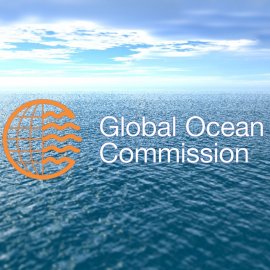Rescue for the Global Ocean, Part 2
-
English
-
ListenPause
I’m Peter Neill, Director of the World Ocean Observatory. In the last edition of World Ocean Radio, I outlined the general goals of a new Global Ocean Commission and its recently publisher report, From Decline to Recovery: A Rescue Package for the Global Ocean, that identifies the five major drivers of ocean degradation and makes proposals and recommendations to advance ocean renewal. Many of these recommendations have been part of the international ocean policy debate for many years; indeed some of them were contained in a similar report by the 1998 Independent Commission for the Future of the Ocean that was the original impetus for the World Ocean Observatory of which World Ocean Radio is a part. That said, this initiative represents a powerful and focused effort on the part of international leaders to regenerate and refocus our collective energy on solutions that respond most directly to the intervening negative circumstances that have challenged the world ocean eco-system to its core. As we are collectively dependent on that system for our future survival, this effort must now succeed. The first two Commission proposals address the over arching challenge of priority action and governance. Within the context of the United Nations process, as defined in its Millennium Development Goals and its progress toward sustainable development, the ocean has consistently been either completely ignored or incorporated into a more comprehensive land-side bias that has ignored or isolated specific ocean-related policy and action and has brought us further toward the crisis we face. Thus, the Commission makes as its first proposal the creation of stand-alone, ocean-specific sustainable development goals that would propose key ocean management reforms for governments, civil society, and private marine enterprise to reach targets that, according to the Report, ensure that all fish stocks are fished sustainably, vulnerable marine areas are protected, biodiversity loss is reversed, illegal unreported and unregulated fishing is eliminated, and the quantity of plastic debris entering the marine environment is reduced by fifty percent. Tactics include science-based management plans, reduced fleet size, diminished subsidies, increased protected areas, better regulation, identification and protection of threatened marine species, satellite monitoring capacity, ratification of existing stock assessment agreements, taxes, restrictions, bans, disposal, and recycling of plastic debris, among many others. The Commission estimates that such measures would affect 3 billion people who rely on the ocean for livelihood, represent $3 trillion in market value of marine and coastal resources (about 5% of the world’s GDP), improve employment and alleviate poverty of the world’s fishers, some 97% of whom live in developing countries, and sustain over 350 million jobs that are linked to the ocean worldwide. The second proposal promotes the care and recovery of the high seas through improved and expanded governance. Specifically, the Commission calls for: • Strengthening UNCLOS, the UN Convention on the Law of the Sea, through a new implementing agreement on the conservation and sustainable use of marine biological diversity beyond national jurisdiction; • Universal ratification of UNCLOS and the UN Fish Stocks Agreement of 1995, and the establishment of an annual meeting of States Parties to this agreement to provide a platform for greater accountability; • Prompt entry into force and implementation of the UN Food and Agriculture Organization Port State Measures Agreement of 2009; • Appointment by the Secretary-General of the United Nations of a Special Representative for the Ocean, with a clear mission and sufficient resources to significantly improve ocean governance; • Creation of Regional Ocean Management Organizations to promote ecosystem-based management of the ocean; • Regular independent assessment of these management organizations to improve their performance; and • Appointment of ocean envoys or ministers by Heads of State or Government. The schematic diagram of international ocean governance structure reveals the complexity of the problem – myriad agendas, multiple agencies, multiple levels within agencies, free-standing organizations, over-lapping jurisdictions, geographical separation, and mechanisms for connection and communications that cannot possibly address integrated solutions with any efficiency. One such entity, UN-Oceans, is designated as an interagency collaboration mechanism, and yet even its position on the organizational chart suggests it is lost as an outlier or after-thought that cannot possibly unite the traditional sectoral approach that is the present system. The Commission concludes, “Strong domestic and international political leadership and engagement is needed to drive governance reforms that will enable the global community to break out of the viscous cycle. We believe that our carefully designed package of interconnected, tangible measures would serve to strengthen and advance the more sustainable, ecosystem-based management of high seas resources.” To inform yourself further, I urge you to visit the Commission website, www.globaloceancommission.org. We will discuss these issues, and more, in future editions of World Ocean Radio.
In Part 2 of a multi-part series on the final report released by the Global Ocean Commission, World Ocean Radio host Peter Neill explains the first two proposals of the 8-part plan for ocean recovery: 1. the UN Sustainable Development Goal for the Ocean: putting a healthy living ocean at the heart of future development, and 2. Governing the High Seas: promoting its care and recovery. ________________________________________________________________________
Peter Neill, host of World Ocean Radio, provides coverage of a broad spectrum of ocean issues from science and education to advocacy and exemplary projects. World Ocean Radio, a project of the World Ocean Observatory, is a weekly series of brief audio essays available for syndicated use at no cost by community radio stations worldwide. Contact us for more information.
Resources from this episode:
< Global Ocean Commission: Final Report
< WORLD OCEAN RADIO: Rescue for the Global Ocean, Part 4
< WORLD OCEAN RADIO: Rescue for the Global Ocean, Part 3
< WORLD OCEAN RADIO: Rescue for the Global Ocean, Part 1
< Global Ocean Commission
- Login to post comments



